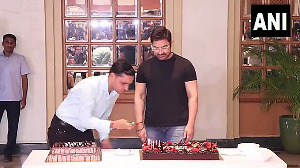

There are many rituals and traditions that surround the Chinese New Year. Some of the more important traditions revolve around the kitchen and the New Year eve dinner.
"My grandmother told me that the food eaten on New Year's day symbolises the good qualities and the expectations one has from the New Year. So we eat all those kinds of food whose name sounds like a word with a lucky meaning. For example, the word for fish in Chinese sounds similar to the word that means ample. We also eat food whose colours and shapes are similar to symbols of happiness, prosperity or luck," says Zeenath Hasan, who runs the Chung Wah restaurant in Bangalore.
 Adds Eddie Wong, son of Mumbai Chinese restaurateur Nelson Wong, "On New Year's day, we have a traditional Chinese meal that includes fish ball soup, steamed rice, Chinese steamed chicken and a colourful cashew and chicken dish."
Adds Eddie Wong, son of Mumbai Chinese restaurateur Nelson Wong, "On New Year's day, we have a traditional Chinese meal that includes fish ball soup, steamed rice, Chinese steamed chicken and a colourful cashew and chicken dish."
On this day, the Chinese will avoid eating food that is chopped up to ensure continuity. The noodles will be served whole and even the chicken will be served with its head, feet and tail.
Even the way the food is served is important.
"The Chinese eat their meals at a round table," explains Peter Liang, who owns a noodle-making factory in Bangalore. "Ten people are seated at the table."
"A traditional dinner will be served at around seven or eight in the evening," says Randolph Allen of Kolkata. "It will have a variety of dishes with auspicious sounding names. There is no dessert in a Chinese meal, but soup is served throughout."
They do, however, prepare a sticky sweet dish made of a particular kind of sea weed cooked with sugar and, sometimes, coconut milk. This sweet is given as an offering to the house deity before the deity is burnt to send it to the court of the Jade Emperor. Sometimes, the deity is also offered honey. The Chinese believe that the sticky sweet will not allow the deity to open its mouth to complain about the family to the Jade Emperor. Even if it opens its mouth, it will say only sweet things.
A few days into the new year, the head of the family will make a new family deity.
Here, Zeenath shares two traditional recipes with rediff.com readers.
Mandarin Fish (Bhetki) 
Ingredients
750 gm whole fish (Bhetki)
1 tbsp ginger, minced
2 tsp garlic, minced
1/3 cup carrots, sliced
1/3 cup capsicum, sliced
1/3 cup onions, sliced
2 cups chicken broth
3 tbsp cornstarch mixed with 3 tbsp water
3/4 tsp salt
1 tsp sugar
1/3 cup soy sauce
2 tbsp tomato ketchup
2 tbsp vinegar
2 tbsp vegetable oil
1 tsp sesame oil
A pinch of pepper
Method
Clean and drain the fish. Rub with salt and marinate for a while. Fry the whole fish in hot vegetable oil until golden brown. Keep aside.
Heat wok over high heat for two to three minutes. Add vegetable oil and heat for 30 seconds. Move the wok around so the oil coats the sides.
Add ginger and garlic and stir for 15 seconds. Add carrots, capsicum and onions and stir quickly. Add chicken broth and simmer briefly. Add cornstarch solution. Mix well. Add salt, sugar, soy sauce, tomato ketchup and vinegar. Bring to a boil. Add sesame oil and pepper and pour over the hot fried fish just before serving.
Tea Eggs
Ingredients
6 eggs
2 star anise
4 tbsp black tea
1 tsp salt
2 tbsp soy sauce
Water
Method
Simmer eggs uncovered in boiling water for 20 minutes. Cool eggs under running water. Crack egg shells with the back of a spoon, but don't take the shell off. Boil the water that was used to boil the eggs again and add rest of ingredients. Simmer for at least an hour. Let the eggs remain in the fragrant water until they are served.
Lead photograph : Liu Jin/AFP/Getty Images






 © 2025
© 2025